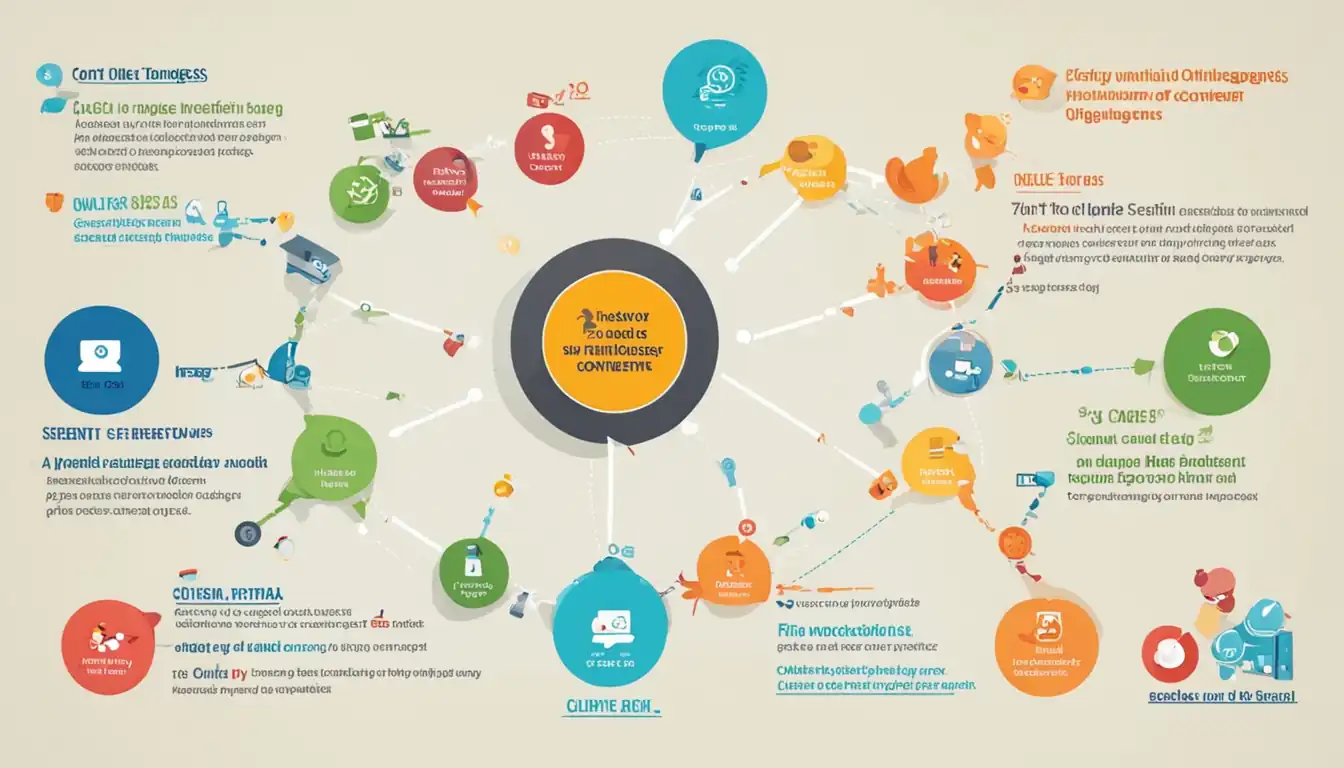Crafting a Winning SEO Content Strategy

Crafting a winning SEO content strategy is like baking a delicious cake - it requires the right ingredients, precise measurements, and a dash of creativity. In today's digital landscape, having a solid SEO content plan is essential for businesses looking to stand out online. So, grab your apron and let's dive into the world of SEO content strategy!
Understanding SEO Content Strategy
What is SEO Content Strategy?
SEO content strategy is a comprehensive plan that outlines how a website's content will be created, optimized, and promoted to improve search engine rankings and attract organic traffic. It involves researching keywords, understanding the target audience, creating high-quality content, and implementing on-page optimization techniques.
Why It's Crucial for Digital Success
A well-crafted SEO content strategy is essential for digital success for several reasons:
Improved Search Engine Rankings: By optimizing your content for relevant keywords and providing valuable information to users, you can increase your chances of ranking higher in search engine results pages (SERPs).
Increased Organic Traffic: With higher rankings comes increased visibility, leading to more organic traffic to your website.
Better User Experience: Creating high-quality, relevant content not only helps with SEO but also improves the overall user experience on your website.
Builds Authority and Trust: Consistently producing valuable content can help establish your brand as an authority in your industry and build trust with your audience.
Higher Conversion Rates: When users find helpful information on your website through search engines, they are more likely to convert into leads or customers.
In conclusion, investing time and resources into developing a solid SEO content strategy is crucial for achieving digital success in today's competitive online landscape.
Key Components of an Effective SEO Content Plan
Research and Use of Keywords
In order to craft a winning SEO content strategy, one of the key components is conducting thorough research on relevant keywords. This involves identifying high-volume keywords that are related to your business or industry. By using tools like Google Keyword Planner or SEMrush, you can determine which keywords have the potential to drive traffic to your website.
Once you have identified these keywords, it is essential to strategically incorporate them into your content. This includes using them in headings, meta descriptions, and throughout the body of your text. However, it is important to avoid keyword stuffing, as this can actually harm your SEO efforts.
Structuring Your Site for Optimal Performance
Another crucial aspect of an effective SEO content plan is structuring your website for optimal performance. This includes creating a clear hierarchy of pages and organizing your content in a logical manner. By doing so, you not only improve the user experience but also make it easier for search engines to crawl and index your site.
Additionally, optimizing your site's loading speed and mobile responsiveness are also important factors in ensuring that your content performs well in search engine rankings. By providing a seamless browsing experience for users across all devices, you increase the likelihood of retaining visitors and ultimately converting them into customers.
By focusing on these key components - research and use of keywords, as well as structuring your site for optimal performance - you can develop a solid foundation for a successful SEO content strategy that drives organic traffic to your website.
Creating Content That Ranks and Converts

Crafting a winning SEO content strategy is essential for businesses looking to improve their online visibility and drive organic traffic to their websites. To create content that not only ranks well on search engines but also converts visitors into customers, it is important to focus on the following key areas:
Developing Topics That Resonate with Your Audience
One of the first steps in creating a successful SEO content strategy is to develop topics that resonate with your target audience. This involves understanding your audience's needs, interests, and pain points, and creating content that addresses these effectively. Conducting keyword research and analyzing trends in your industry can help you identify popular topics that are relevant to your audience.
Writing Techniques That Improve Search Engine Visibility
In addition to developing relevant topics, it is important to use writing techniques that improve search engine visibility. This includes incorporating relevant keywords naturally throughout your content, optimizing meta tags and descriptions, using header tags appropriately, and creating high-quality, engaging content that keeps readers on your page.
By focusing on developing topics that resonate with your audience and using writing techniques that improve search engine visibility, you can create content that ranks well on search engines and drives conversions for your business.
Tools and Technologies to Enhance Your SEO Efforts
In the world of SEO content strategy, having the right tools and technologies at your disposal can make all the difference. Here are some essential software and platforms that can enhance your SEO efforts:
Essential Software for Keyword Analysis
Keyword analysis is a crucial aspect of any SEO content strategy. By understanding what keywords your target audience is searching for, you can tailor your content to meet their needs. Here are some essential software tools for keyword analysis:
Google Keyword Planner: This free tool from Google allows you to research keywords and see how they perform in terms of search volume and competition.
Semrush: Semrush is a comprehensive SEO tool that offers keyword research, competitor analysis, and more to help you optimize your content for search engines.
Ahrefs: Ahrefs is another powerful tool for keyword research, backlink analysis, and site auditing, providing valuable insights into your competitors' strategies.
Leveraging Analytics to Refine Your Strategy
Analytics play a crucial role in refining your SEO content strategy. By tracking key metrics such as organic traffic, bounce rate, and conversion rates, you can gain valuable insights into what is working well and what areas need improvement. Here are some tools and technologies to help you leverage analytics effectively:
Google Analytics: Google Analytics is a powerful platform that provides detailed insights into website traffic, user behavior, and more. By analyzing this data, you can make informed decisions about how to optimize your content for better performance.
SEMrush Traffic Analytics: SEMrush also offers a Traffic Analytics tool that allows you to analyze website traffic trends, identify top-performing pages, and track competitor performance to inform your own strategy.
Hotjar: Hotjar is a heat mapping tool that provides visual insights into user behavior on your website. By understanding how users interact with your content, you can make data-driven decisions to improve user experience and drive better results.
By utilizing these tools and technologies effectively in your SEO content strategy, you can stay ahead of the competition and drive meaningful results for your business.
Measuring the Success of Your SEO Content Strategy
Crafting a winning SEO content strategy is only half the battle. To truly succeed in the competitive online landscape, it is crucial to measure the effectiveness of your efforts and make adjustments as needed. Here are some key considerations for measuring the success of your SEO content strategy:
Key Performance Indicators to Watch
When evaluating the performance of your SEO content strategy, it is important to track key performance indicators (KPIs) that provide insight into how well your content is resonating with your target audience and driving organic traffic to your site. Some essential KPIs to monitor include:
- Organic Traffic: Measure the amount of traffic coming to your site from search engines.
- Keyword Rankings: Keep an eye on where your target keywords rank in search engine results pages (SERPs).
- Bounce Rate: Monitor how many visitors leave your site after viewing only one page.
- Conversion Rate: Track the percentage of visitors who take a desired action on your site, such as making a purchase or filling out a contact form.
- Time on Page: Measure how long visitors spend engaging with your content.
By regularly monitoring these KPIs, you can gain valuable insights into the effectiveness of your SEO content strategy and identify areas for improvement.
Adjusting Your Tactics Based on Analytics Data
Once you have collected data on key performance indicators, it is essential to analyze this information and make informed decisions about adjusting your tactics. Use analytics tools such as Google Analytics to identify trends, patterns, and opportunities for optimization.
If you notice that certain pieces of content are performing exceptionally well, consider creating more similar content to capitalize on this success. On the other hand, if you find that certain keywords are underperforming, adjust your keyword targeting strategy accordingly.
Remember that SEO is an ongoing process, and continuous monitoring and adjustment are necessary to stay ahead of the competition and drive sustainable organic traffic growth. By leveraging analytics data to inform your decision-making process, you can refine your SEO content strategy over time and achieve lasting success in the digital realm.
Conclusion
In conclusion, mastering the art of SEO content strategy is key to unlocking digital success. By understanding the components of an effective plan, creating high-quality content, utilizing the right tools and technologies, and measuring success through analytics, you can take your online presence to new heights. So roll up your sleeves, get creative, and start crafting a winning SEO content strategy today!